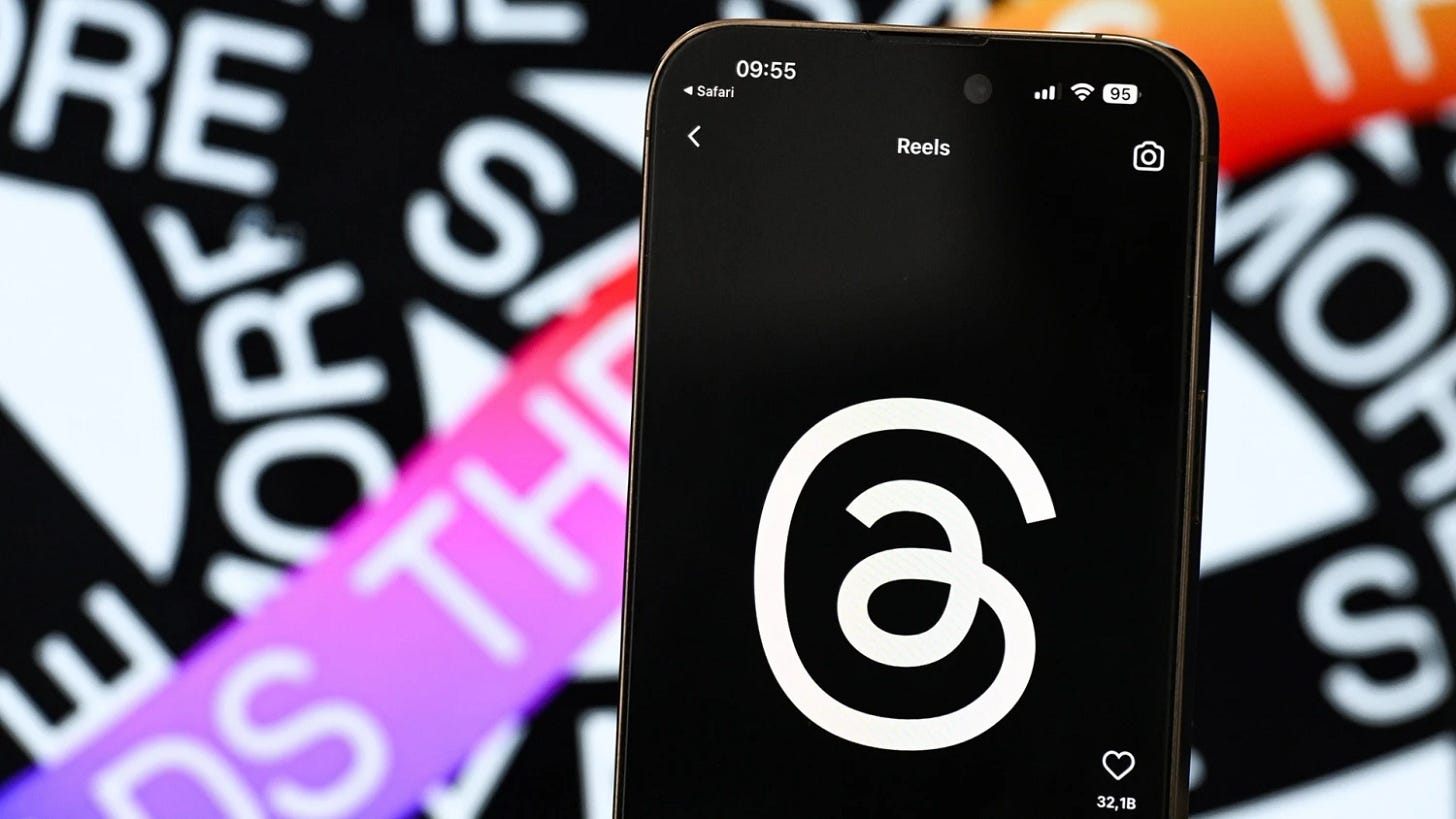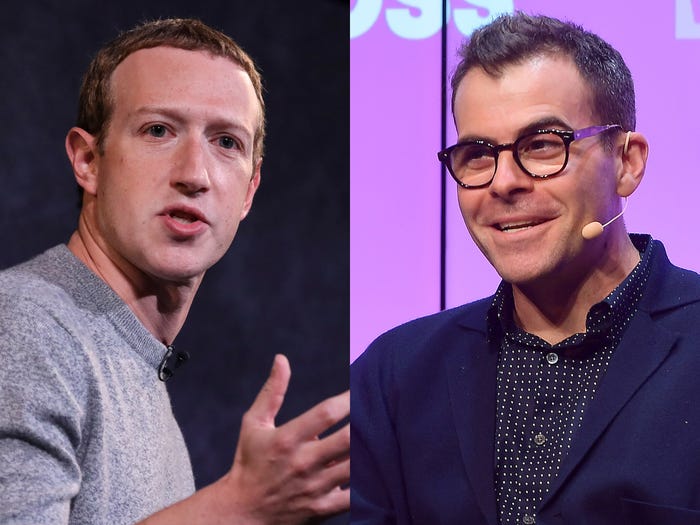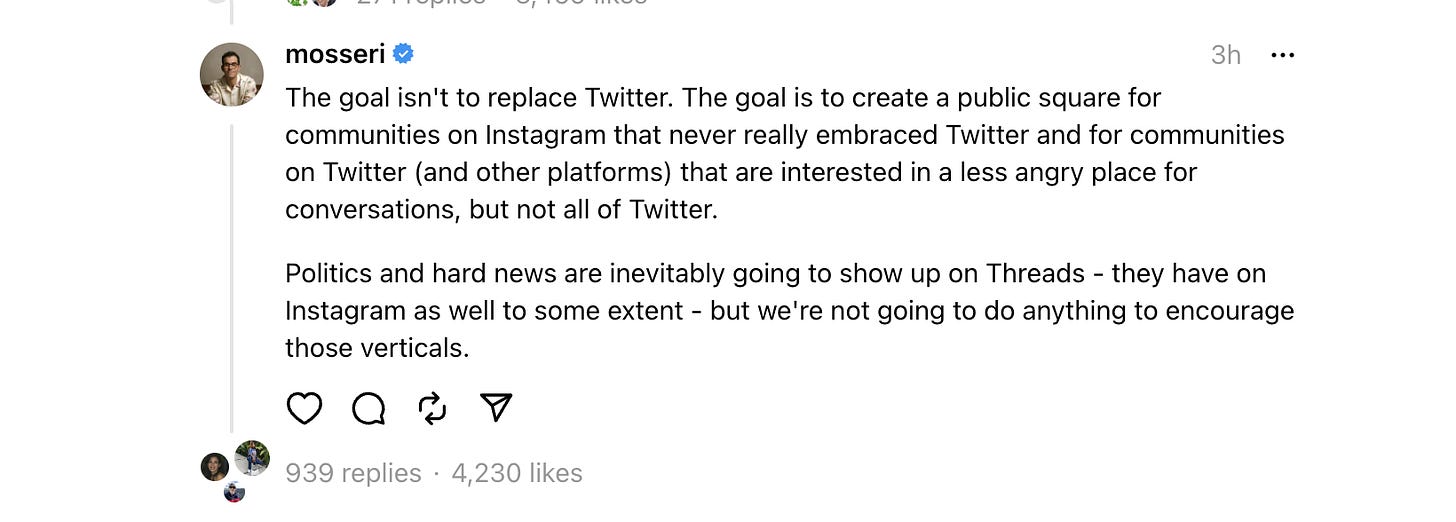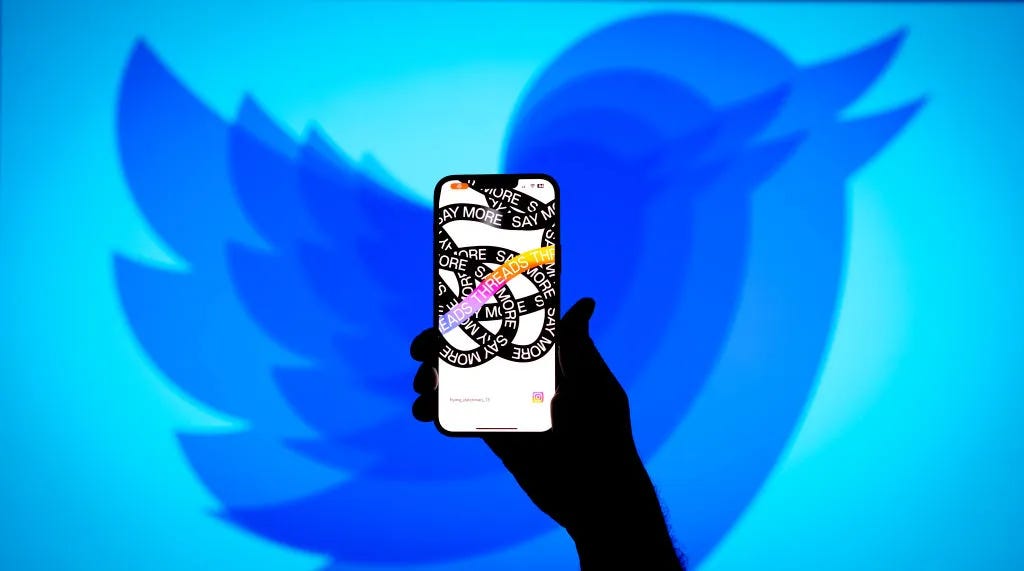After the Honeymoon: The Virtual Threats with Threads
A week into Threads' existence, what can we expect from the new social media app?
Meta launched its new social media platform Threads on July 5th with little warning. The app was instantly met with excitement and celebration, most loudly manifested by the 100 million users who signed up in 5 days – crushing previous records for social media apps.
Capitalizing on Instagram as a foundation, Threads was spawned into existence without having to start from the bottom. By tapping celebrities and notable figures into the app, Meta threaded the needle of creating a new social media platform with an established universe of users, figures, and followers invested in the Instagram architecture.
A “Less Angry Twitter”
The masterminds of Threads, notably Mark Zuckerberg and Adam Mosseri, call the app a “less angry Twitter.” Leveraging Instagram as a springboard, Zuckerberg further characterizes it as Instagram’s text-driven companion, which centers “kindness” and cultivating “friendly spaces” as the foundation of Threads’ culture.
As Twitter morphed under the leadership of Elon Musk, Meta saw an opportunity to enter the text-based social media platform marketplace. The ubiquity of ads, monetized algorithms, charging for verification, and un-verifying reputed sources disfigured the Twitter timeline. For many longtime users, Twitter became unrecognizable with what it was, and what made it a galvanizing place for online citizens, or “netizens.” This turned off legions of users and pushed tens of thousands away.
Threads moved to fill that void. And in short time, emerged into a platform that could replace Twitter. Or at worst, rival it for the hearts and minds of virtual voices with something to say, instead of merely vain pictures or vapid dances to post.
Concerns with Threads
However, one week into Threads’ existence, what should we expect from the new social media app?
Underneath the clean interface and executive claims of “kindness,” a series of privacy, speech, and censorship claims exist with Threads, and should not be drowned out by the public chorus of praise and prolific success of the app. I organize the concerns under three categories (1) Privacy; (2) Speech; and (3) Censorship.
Privacy Concerns
Social media apps are not free. But instead of paying money to use them, we exchange a currency far more valuable: our private and personal data. This data includes the information we enter our personal biographies, the information mandated by the application contract, and the content we volunteer with our online activity. Individual users, therefore, become sources of coveted data for Big Tech giants like Meta, who become proprietors of user data to be sold to third party advertisers, corporations, governments, and more.
As “datafied” individuals, we exchange our access to social media platforms like Threads for the data they harvest from us. This industry of “surveillance capitalism” comes with considerable risks, which are more pronounced on Threads:
Threads Collects Your Personal Data – this information includes your race, ethnicity, gender, biometric data, sexual orientation, religion, pregnancy status, political affiliations, and involvement with labor unions or groups.
Threads Collects Data About Your Health – this information includes weight, height, fitness, exercise routines, and health-related hazards and history (potentially).
Threads Collects Data About Employment – this information includes your company or institution of employment, employment history, length of employment, position and role, colleagues, and more.
Threads Collects Data About Your Location – this information includes IP-address-based location, in addition to photos, videos, text and other content indicating location.
Threads Integrates Preexisting Data From Instagram – given that the two apps are synchronized, preexisting data and content stored on Instagram is retrievable by Threads.
Threads Sells Your Data to Third Parties – information you post is owned by Threads (e.g., Meta) and can be sold to third parties. These third parties include corporations, educational institutions, governments, and more.
Threads Data Sharing Enhances Racial Profiling and Surveillance – personal data owned by Meta could be sold to law enforcement and policing agencies, which is of particular concern to vulnerable groups like Muslims, Black activists, stateless refugees, and asylees.
Threads Currently Restricts Deleting App Without Deleting Instagram – as currently constructed, a user cannot delete their Threads account (after opening one) without deleting their undergirding Instagram account. This technical bind designed by Meta compels users, who are deeply invested in their Instagram account, to maintain a Threads account.
Speech Concerns
Free speech, as legally understood, does not exist on social media platforms. These virtual platforms are privately owned spaces, which enables its regulators to control, regulate, and moderate the online speech of its users. Despite this reality, Meta has long peddled the idea that its online spaces are forums of political freedom and unregulated speech.
The murky history of Facebook about political speech concerns conveys otherwise. While the recent public statements from Threads leadership highlight a series of concerns with what forms of speech will be rewarded, and what types of speech could be repressed:
Threads is “Not for News and Politics” - Instagram CEO Adam Mosseri posted that Threads is not for “hard news” and “politics,” indicating explicit content-based discrimination for users focused squarely on politics.
Threads Leverages “Kindness” to Silence Political Speech – users, like me, who use social media apps to highlight political issues should be wary of the “kind” and “apolitical” labels attributed to Threads as proxies for silencing political content and online advocacy.
Threads May Design Algorithms that Repress Political Content – explicit overtures in opposition of political speech by Meta leadership indicates a strong presumption of algorithm designs that suppress, shadow-ban, and punish users that actively share political content.
Threads Disproportionately Harms Political Users in Undemocratic Societies – suppression of political content has a dire impact on users in countries where speech is limited, punished, or nonexistent (e.g., Egypt or India), and platforms like Threads offer virtual public squares to organize, engage in dissent, and build global connections.
Threads Conditions Apolitical Netizens and Citizens – beyond a space for virtual interaction, social media has a deep conditioning effect on its users – particularly younger generations – and its emphasis on being apolitical will incentivize users to steer clear from political speech and activity online, which will be replicated offline.
As of July 2023, Threads is illegal in the European Union. On July 4th, a day before the launch of the app, the European Court of Justice ruled that Facebook cannot use a “legitimate interest” to capitalize on personal user data to drive third party advertising. This comprises the very foundation of Meta’s economic model and Threads its new virtual vehicle.
Censorship Concerns
Threads commitment to moderate political speech invites concerns of censorship. And namely, censorship of content and accounts that use social media apps for pointedly political purposes. These concerns are particularly stark for user who produce political content that clashes with the dominant political sensibilities at Meta, and Threads:
Threads Aversion to Political Speech a Red Flag – explicit overtures by Meta leadership in opposition to political content may usher in punitive measures that includes algorithmic relegation of political content, shadow-banning users, ghosting political content, or de-monetizing users if Threads adds a monetization component to its architecture.
Threads Unilaterally Decides What Qualifies as “Political Content” – the very meaning of “political” and “hard news” is entirely subjective and unclear, which grants Threads leadership complete authority over deciding which content to censor in alignment with its arbitrary definitions and political sensibilities.
Threads Aversion to Political Speech is a Political Position – the ability to define what is “political” encompasses the power to label items aligned with your worldview as apolitical (e.g., solidarity with Ukraine) and that which you disagree with as “political” (e.g., Israel/Palestine) which opens the door for Threads to censor political speech it disagrees with and endorse political speech it agrees with.
Threads Censors Political Users But Sells Data to Political Entities – while committed to curating Threads as an apolitical space, Meta contradicts this mission by selling private data to political entities including government agencies (e.g., FBI and CIA), political parties (e.g., Republican and Labor Parties), and third-party news outlets (e.g., CNN and Fox News).
Killing Users with “Kindness”
A week into its honeymoon, the excitement around Threads has overshadowed concerns. The decline of Twitter, a forum where politics was the very lifeline, opens the door for Threads to capture netizens in search of a virtual nation free of toxicity, hate-mongering, and chaotic rulemaking.
Certainly, difficult decisions will have to be made by Zuckerberg, Mosseri, and the Threads brass to stave off the toxicity that derailed Twitter. Moderating online speech is challenging, particularly with the rise of trolling, racism, and bigotry that capitalizes on free speech purity as a shield and sword. Finding a balance is as challenging as any task for any interactive, text-driven social media app. But speech moderation must not come at the expense of the brand of expression and user freedom that catapulted its rise – and the spring of social media platforms at large more than a decade ago.
Furthermore, the Threads’ bind of suppressing political speech and eating into the privacy of its users makes for a parasitic relationship with its users: namely, one that feeds off the limitless data produced by the user for limitless profits, while conditioning them to become controlled, conformist, and politically quiet actors.
I am an avid user of Threads, and on one hand, am very excited about the growth of the app. Particularly at a time when Twitter, where my public voice was catapulted, has devolved into a space of violent hate-mongering, heavy regulation, and unregulated hubris from its head Twit.
These critiques and concerns, more than anything, are meant to equip users with the armor to navigate their activity on Threads as it expands its footprint . But also, with the hopes that Meta leadership will heed them in building a more sustainable, democratic, and nondiscriminatory experience.
Khaled A. Beydoun is a law professor and author of The New Crusades: Islamophobia and the Global War on Muslims. You can follow his socials at @khaledbeydoun.







